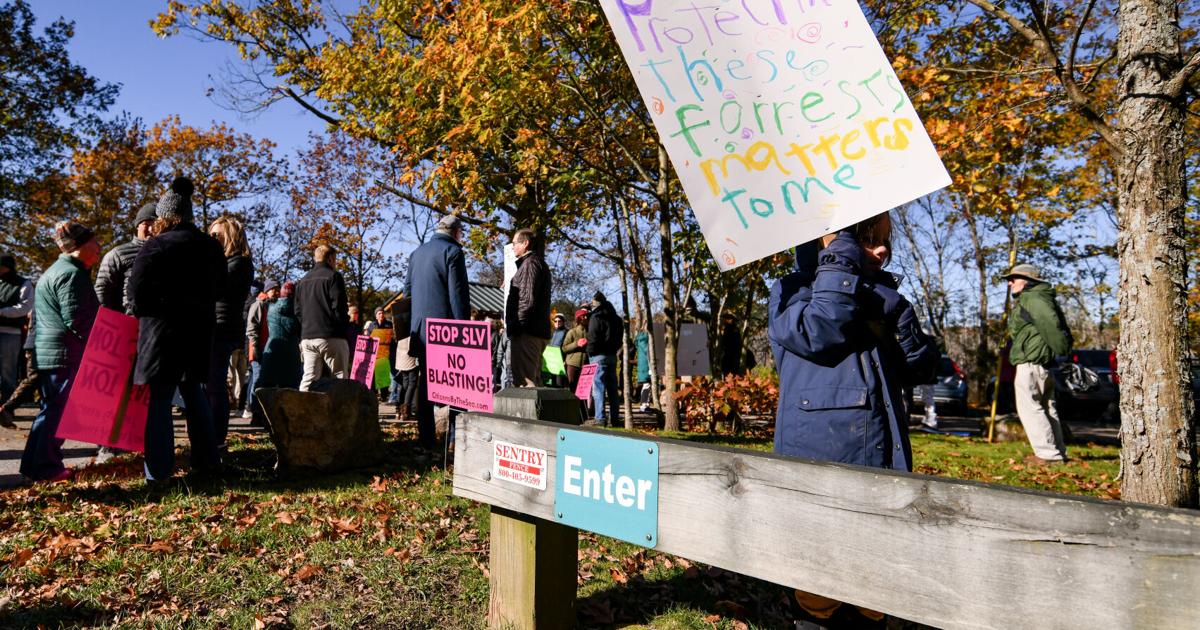
MANCHESTER-BY-THE-SEA — State and local officials, as well as Cape Ann residents, got an up-close-and-personal look Wednesday at the site of a proposed 136-unit housing development.
About 100 officials and residents attended the tour that’s part of an appeals process being conducted by the Massachusetts Housing Appeals Committee.
Last year, the town Zoning Board of Appeals denied a comprehensive permit for the development of “The Sanctuary,” a 136-condominium complex at Shingle Hill Place, off School Street and close to Route 128. Developer Strategic Land Ventures then appealed that decision to the Massachusetts Housing Appeals Committee. The appeal has been moving slowly through the legal process since.
Wednesday’s gathering was attended by representatives from the Massachusetts Housing Appeals Committee, town officials, Manchester Essex Conservation Trust trustees and conservation advocates.
Many residents in attendance held signs expressing their opposition to the project. The wooded Shingle Hill site is surrounded by the Manchester Essex Wilderness Conservation Area.
Ani Sarkisian, the communications and engagement coordinator for the Manchester Essex Conservation Trust (MECT), said she hoped the turnout sent a message.
“We are just here showing our presence and opposition to this project,” she said.
Attempts to reach Geoffrey Engler, co-founder of Strategic Land Ventures, before publication were unsuccessful.
Herbert Pitschelt, a former MECT member, was one of many present on Wednesday to show opposition to the project.
“It’s a disaster, of course,” he said.
MECT Executive Director Patrice Murphy said the appeals process will be a long one.
“The main purpose is to support the ZBA’s decision,” she said. “This is just one step in the process. It’s good to see Manchester’s support.”
Greg Crockett, of member of the MECT Board of Trustees, predicted the Massachusetts Housing Appeals Committee will ultimately decide in favor of Strategic Land Ventures — moving the project ahead.
“We’re prepared to take it to the next step,” he said, referring to possible litigation to oppose the building effort.
Crockett said the Massachusetts Housing Appeals Committee’s first public hearings on the matter may take place in Manchester the first week of March. The hearings should last three to four weeks, he said, adding he predicts a final decision to be rendered in the spring of 2025.
Crockett said it’s likely the HAC will approve it.
“I think it’s dreadful,” he said of the building proposal, pointing to the site’s proposed access road, saying would be too steep for drivers to safely navigate. “If ever there were an accident waiting to happen, this would be it. It’s a recipe for disaster.”
Crockett also said, from a practical perspective, the idea makes little sense since children who would live in the development would be close enough to town schools to be unqualified for busing and required to walk.
Standing close to Crockett was Essex resident Jade Gedeon, who also opposes the project.
“I hope it doesn’t happen,” Gedeon said. “I think a lot of people don’t want this to happen. I don’t want to exclude people but I think there’s a better way.”
Manchester-by-the-Sea Planning Board member Mary Foley said, while she does not speak for the board, has concerns about the project.
“I hope it gets denied because of the environmental concerns,” she said.
The gathering was an opportunity for the Massachusetts Housing Appeals Committee to weigh the merits of the housing project versus the perceived negative consequences of its development, said Doug Bailey, a public relations representative working for the Manchester Essex Conservation Trust.
“It’s the MHAC’s chance to see the property in person as part of the appeal process,” he said. “The aim for them is partly to determine the outcome of the appeal.”
MECT and others in the community believe the proposed 40B development will “chop off the top of Shingle Place Hill” and cause damage to the environment, wildlife habitat and conservation land in the area. The 40B affordable housing statute was never intended to allow developers to bypass local wetland bylaws, Bailey said.
Although MECT recognizes the need for affordable housing, this project is “not the way forward,” he said.
“Land trusts and towns cannot afford to purchase parcels for conservation if land values become hyper inflated by the proposed 40B developments in areas that would be otherwise unbuildable.”
Stephen Hagan can be reached at 978-675-2708 or at [email protected].
